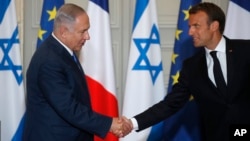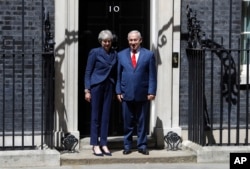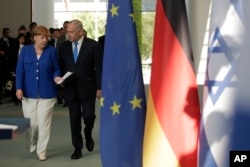Aides to Israeli Prime Minister Benjamin Netanyahu say they believe he has made progress in persuading Western powers that they need to do more to counter Iranian influence in the Middle East and contain Tehran’s military ambitions in the region. His trip to Western Europe comes amid some objections to the U.S. decision to pull out of the Iran nuclear deal.
Netanyahu’s four-day European trip, meeting with national leaders in Berlin, Paris and London, was an important stage, the aides say, in trying to persuade European leaders to cooperate with Israel on the Iran-related issues of ballistic missile development and regional stability, despite markedly different views on the Iran nuclear deal and Israeli actions in Gaza. The aides see the trip as part of a long-term diplomatic campaign of attrition.
“We didn’t expect to change minds totally,” said an Israeli diplomat. “But we are chipping away and when it came to the issues of Iran’s ballistic missile development and Tehran’s meddling in the region and military entrenchment in Syria and the threat to Israel, we got sympathetic hearings from Merkel, Macron and May,” he added, referring to German Chancellor Angela Merkel, French President Emmanuel Macron and British Prime Minister Theresa May.
Netanyahu’s trip came in the wake of U.S. President Donald Trump’s decision last month to withdraw from the deal his predecessor, Barack Obama, agreed with on Iran to limit its nuclear program. European leaders have debated their response to reimpose U.S. sanctions on Iran.
Economic realities
Britain, France and Germany, which are co-signatories of the deal, known as the Joint Comprehensive Plan of Action (JCPOA), have said they will keep their end of the nuclear bargain by trying to keep the agreement alive with Tehran, and they are considering legal moves to try to shield their businesses from the sanctions.
Israeli diplomats with whom VOA has spoken say they sense European leaders are realizing that regardless of what they do, European companies and banks will be loath to trade with Iran and become enmeshed in another trans-Atlantic dispute. A growing number of European companies have announced they will discontinue business with Iran. They include Airbus, automakers Peugeot and Citroen, along with French oil giant Total and shipping and haulage firms.
“At no point in the separate talks did we say the Europeans should also walk away from the Iran deal, we didn’t have to as we think it will become increasingly a dead letter,” said an Israeli diplomat, speaking on condition of anonymity.
Netanyahu sought to sidestep disagreements between Israel and the Europeans over the deal. In his joint news conference with the German chancellor, he said, “I have not changed my view of the JCPOA, but I think that right now that is becoming a secondary question, because the U.S. has left the deal,” he said. “I think the real question we have to confront is: What do we do about Iran’s aggression, what do we do about Iran’s remaining goal and pursuit of nuclear weapons.”
In Paris, Netanyahu said he had not asked Macron to exit the deal, adding, “I think that economic realities are going to decide this matter, so that is not what we focused on. What I focused on is to stop Iranian aggression in the region.”
An Israeli diplomat predicted that for Europe, the priority will increasingly become the intensifying dispute with the U.S. over the metal tariffs imposed by Trump. “Iran and sanctions will take second billing,” he said.
Gaza protests
For Netanyahu, the greater challenge was over the issue of Gaza, Israeli and Western diplomats acknowledge.
On Thursday, during an event at a research institute in London, Netanyahu mounted a strong defense of Israel’s actions in recent weeks against protesters on the Israel-Gaza border. He said no country has a non-lethal alternative against protesters purposely seeking fatalities.
“When I talk with European leaders, I always say, What would you do?’” he said.
Netanyahu said the goal of Hamas, the militant group organizing the protests, was to have many casualties.
In his meetings with European leaders, Netanyahu argued the Gaza protests were further proof of Iran’s destabilizing influence.
Midweek, there were reports that last month, the Palestinian Authority had warned the French government that Iran was financing and encouraging protests along the Gaza border, but had told Paris it had no choice but to support the demonstrations because many of the participants were ordinary Palestinians protesting their dire economic plight.
Netanyahu’s aides say he made the most headway during his whirlwind tour in Berlin. Netanyahu and Merkel have had rocky relations in the past, but the German chancellor appeared less frosty publicly with the Israeli leader and more conciliatory, announcing a planned visit to Jerusalem with her Cabinet in October for a government-to-government meeting.













